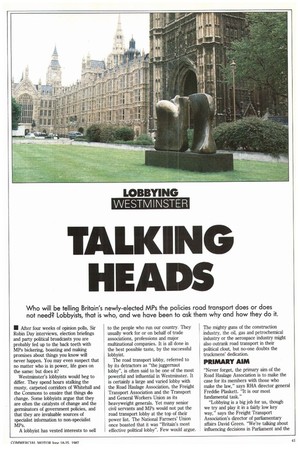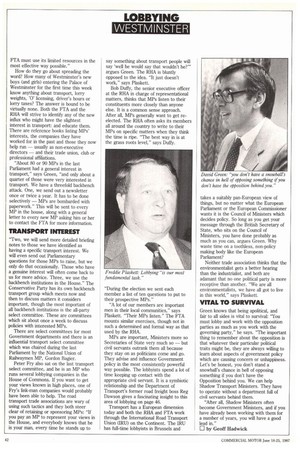TALKING HEADS
Page 43

Page 44

If you've noticed an error in this article please click here to report it so we can fix it.
Who will be telling Britain's newly-elected MPs the policies road transport does or does not need? Lobbyists, that is who, and we have been to ask them why and how they do it.
• After four weeks of opinion polls, Sir Robin Day interviews, election briefings and party political broadcasts you are probably fed up to the back teeth with MPs bickering, boasting and making promises about things you know will never happen. You may even suspect that no matter who is in power, life goes on the same: but does it?
Westminster's lobbyists would beg to differ. They spend hours stalking the musty, carpeted corridors of Whitehall and the Commons to enstire that things do change. Some lobbyists argue that they are often the catalysts of change and the germinators of government policies, and that they are invaluable sources of specialist information to non-specialist MPs.
A lobbyist has vested interests to sell to the people who run our country. They usually work for or on behalf of trade associations, professions and major multinational companies. It is all done in the best possible taste, by the successful lobbyist.
The road transport lobby, referred to by its detractors as "the juggernaut lobby", is often said to be one of the most powerful and influential in Westminster. It is certainly a large and varied lobby with the Road Haulage Association, the Freight Transport Association and the Transport and General Workers Union as its heavyweight generals. Yet many senior civil servants and MPs would not put the road transport lobby at the top of their power list. The National Farmers' Union once boasted that it was "Britain's most effective political lobby". Few would argue. The mighty guns of the construction industry, the oil, gas and petrochemical industry or the aerospace industry might also outrank road transport in their political clout, but no-one doubts the truckmens' dedication.
PRIMARY AIM
"Never forget, the primary aim of the Road Haulage Association is to make the case for its members with those who make the law," says RI-IA director general Freddie Plaskett. "It is our most fundamental task."
"Lobbying is a big job for us, though we try and play it in a fairly low key way," says the Freight Transport Association's director of parliamentary affairs David Green. "We're talking about influencing decisions in Parliament and the FTA must use its limited resources in the most effective way possible."
How do they go about spreading the word? How many of Westminster's new boys (and girls) entering the Palace of Westminster for the first time this week know anything about transport, lorry weights, '0' licensing, driver's hours or lorry taxes? The answer is bound to be virtually none. Both the FM and the RHA will strive to identify any of the new influx who might have the slightest interest in transport: and educate them. There are reference books listing MPs' interests, the companies they have worked for in the past and those they now help run — usually as non-executive directors — and their trade union, club or professional affiliations.
"About 80 or 90 MPs in the last Parliament had a general interest in transport," says Green, "and only about a quarter of those were very interested in transport. We have a threefold backbench attack. One, we send out a newsletter once or twice a year. It has to be done selectively — MPs are bombarded with paperwork." This will be sent to every MP in the house, along with a general letter to every new MP asking him or her to contact the FTA for more information.
TRANSPORT INTEREST
"Two, we will send more detailed briefing notes to those we have identified as having a specific transport interest. We will even send out Parliamentary questions for those MPs to raise, but we only do that occasionally. Those who have a genuine interest will often come back to us for more advice. Three, we use the backbench institutions in the House." The Conservative Party has its own backbench transport group which meets now and then to discuss matters it considers important, though the most important of all backbench institutions is the all-party select committee. These are committees which sit about once a week to discuss policies with interested MPs.
There are select committees for most Government departments and there is an influential transport select committee which was chaired during the last Parliament by the National Union of Railwaymen MP, Gordon Bagier.
Peter Fry also sat on the last transport select committee, and he is an MP who runs several lobbying companies in the House of Commons. If you want to get your views known in high places, one of Fry's link-man companies would probably have been able to help. The road transport trade associations are wary of using such tactics and they both steer clear of retaining or sponsoring MPs: "If you pay an MP to represent your views in the House, and everybody knows that he is your man, every time he stands up to say something about transport people will say 'well he would say that wouldn't he?" argues Green. The RHA is bluntly opposed to the idea. "It just doesn't work," says Plaskett.
Bob Duffy, the senior executive officer at the RHA in charge of representational matters, thinks that MPs listen to their constituents more closely than anyone else. It is a common sense approach. After all, MPs generally want to get reelected. The RHA often asks its members all around the country to write to their MPs on specific matters when they think the time is ripe. "The best way in is at the grass roots level," says Duffy.
"During the election we sent each member a list of ten questions to put to their prospective MPs."
"A lot of our members are important men in their local communities," says Plaskett. "Their MPs listen." The FTA mounts similar exercises, though not in such a determined and formal way as that used by the RHA.
MPs are important, Ministers more so Secretaries of State very much so — but civil servants outrank them all because they stay on as politicians come and go. They advise and influence Government policy in the most consistently powerful way possible. The lobbyists spend a lot of time keeping up contact with the appropriate civil servant. It is a symbiotic relationship and the Department of Transport's former road freight boss Reg Dawson gives a fascinating insight to this area of lobbying on page 46.
Transport has a European dimension today and both the 1RHA and FTA work through the International Road Transport Union (1RU) on the Continent. The IRU has full-time lobbyists in Brussels and takes a suitably pan-European view of things, but no matter what the European Parliament or the European Commissioner wants it is the Council of Ministers which decides policy. So long as you get your message through the British Secretary of State, who sits on the Council of Ministers, you have done probably as much as you can, argues Green. Why waste time on a toothless, non-policy making body like the European Parliament?
Neither trade association thinks that the environmentalist gets a better hearing than the industrialist, and both are adamant that no one political party is more receptive than another. "We are all environmentalists, we have all got to live in this world," says Plaskett.
VITAL TO SURVIVAL
Green knows that being apolitical, and fair to all sides is vital to survival: "You must lobby and work with the opposition parties as much as you work with the governing party," he says. "The important thing to remember about the opposition is that whatever their particular political traits might be, they are always willing to learn about aspects of government policy which are causing concern or unhappiness. Let's be honest, you don't stand a snowball's chance in hell of opposing something if you don't have the Opposition behind you. We can help Shadow Transport Ministers. They have to operate without a department full of civil servants behind them.
"After all, Shadow Ministers often become Government Ministers, and if you have already been working with them for a number of years, you will have a good lead in."
El by Geoff Hadwick




































































































